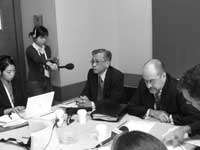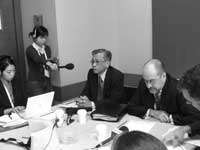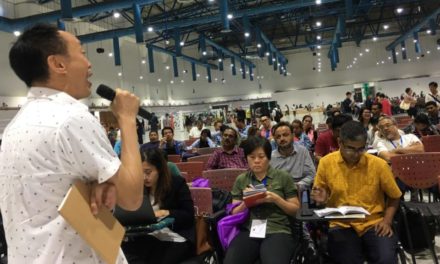 With the negotiations stalemated in the key areas, the WTO Secretariat and the big trade powers are using a scheme of pushing through a “development package” to pass off the current ministerial conference as a success – when the Hong Kong WTO Ministerial is by definition, already a failure.
With the negotiations stalemated in the key areas, the WTO Secretariat and the big trade powers are using a scheme of pushing through a “development package” to pass off the current ministerial conference as a success – when the Hong Kong WTO Ministerial is by definition, already a failure.The idea is to gain consensus for the development package now, then push for agreement on the more controversial areas of services, agriculture, and non-agricultural market access in a more protracted process extending over the next few months, possibly culminating in another ministerial by the middle of 2006.
The only problem is that the developing countries are not likely to fall for it, because they realize that this development package is empty.
“The development package is deceptive and dangerous. Its purpose is not to assist developing countries integrate trade into development, but to trick them assenting to a problematic deal,” said Dr Bello.
“It is meant to split the ranks of the developing countries, thus facilitating an agreement that only serves the interests of the rich countries. We urge the developing country governments to stand together and reject this package.”
One component of the development package is the hollow ‘aid for trade’ scheme. A significant part of this aid will be in the form of loans, which will simply drag developing countries deeper into debt. At its base, the real aim of the scheme is to enable developing countries to comply with their WTO commitments to liberalize trade.
Neither can the incorporation of the TRIPs and Health implementing decision count as a positive element development-wise since the export of life-saving drugs is so hemmed in with onerous restrictions that few, if any, countries will be able to actually use it.
“How can the LDCs take the commitments of the developed countries seriously when the US continues to maintain cotton subsidies that have wrought tremendous suffering among West African farmers?,” asks Dr Bello.
“How can they take this package seriously when what the US is considering as compensation–$7 million to five countries–is miniscule compared to the tremendous losses in incomes and livelihoods that African farmers have suffered?”
The problem is the current rules and institutions governing trade; no amount of aid can ever substitute for the fundamental transformation of these rules and institutions.
*Focus on the Global South is a research, analysis, and advocacy organization connected to Chulalongkorn University in Bangkok, Thailand www.focusweb.org. For more information call Brett Solomon +852 6497 2675








